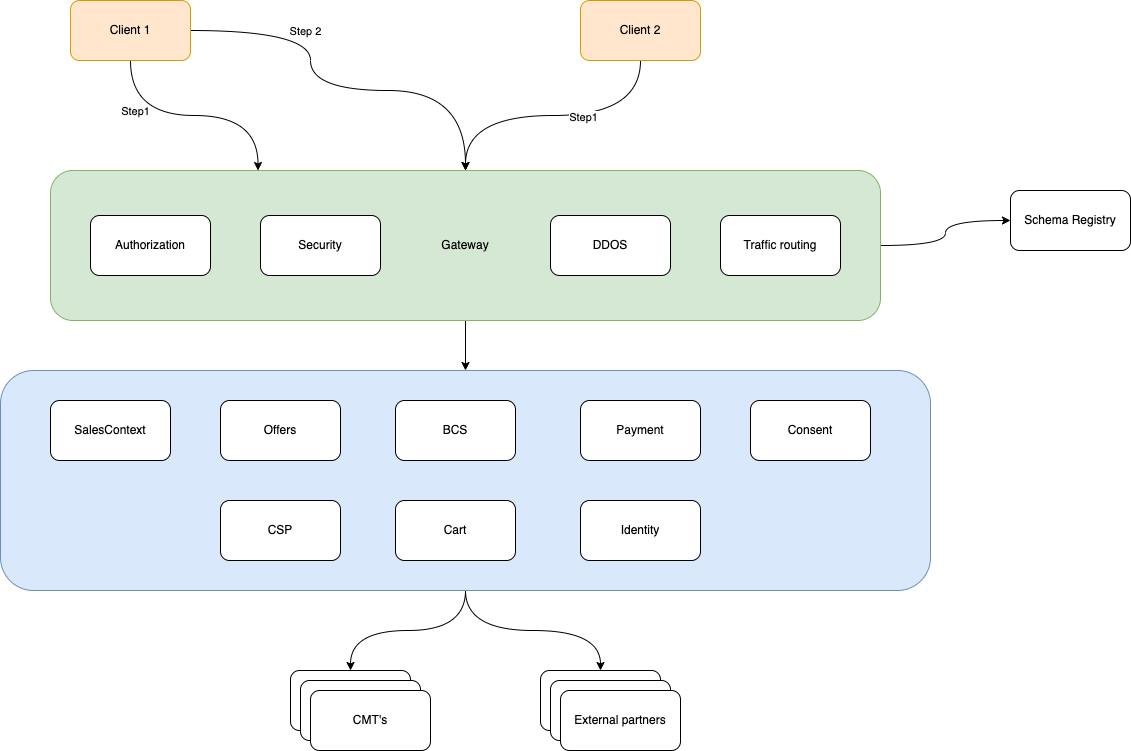XCP Gateway
Introduction
XCP Gateway is a unified interface built with modern technologies for end consumers consumption. The guiding philosophies in designing this platform include
- Security
- Ease of consumption
- Simple
- Performance
Architecture

One of the primary strengths of an API gateway lies in its ability to simplify and streamline the architecture of complex systems. Instead of managing individual APIs separately, an API gateway serves as a single entry point for all API requests. This consolidation not only reduces complexity but also facilitates better management, monitoring, and security of APIs.
Features
Security
- Authorization and Authentication
- Throttling or rate limiting
- DDOS prevention
Reliability
- Multi-AZ and Multi-Region
XCP Gateway is a federated graphql gateway which aggregates and orchestrates a network of microservices to expose sales domain model for consumption.
Getting started
- You can have a conversation with xcp-jarvis chatbot to understand what the sales platform has to offer
- Try out the playground to understand the datapoints and operations available on the sales platform https://developer.xoe.xfinity.com/playground.html
- Get a api key for your sales channel to consume xcp
- Request scopes on websec/sat/cima/azure as needed for your channel
- Start consuming the api's
Headers
| Header | Description |
|---|---|
| x-api-key | api key for the consumer, Request one with the XCP team if you don't have one. |
| x-tracking-id | a unique identifier to track the request that is sent to gateway |
| Authorization | Bearer token for authentication and authorization |
Onboarding
- An API Key is required to consume the gateway. Raise a JIRA ticket here to get the api key.
- Following authentication mechanisms will be supported in the gateway, based on the use case one or more scopes would be required
| Operation | Type | Scope | Auth Type |
|---|---|---|---|
| Mutation | createSalesContext | xcp:salescontext:create | SAT |
| Mutation | upsertItem | sales:cart:pseudo:all | SAT |
| Mutation | presentConsent | xcp:consent:present | SAT |
| Mutation | acceptConsent | xcp:consent:accept | SAT |
| Mutation | createAndAcceptConsent | xcp:consent:create, xcp:consent:accept | SAT |
| Mutation | submitCart | sales:cart:pseudo:all | SAT |
| Query | Sales -> offers | sales:bcs:pseudo:all | SAT |
| Query | Sales -> cart | sales:cart:pseudo:all | SAT |
| Query | Sales -> order | sales:cart:pseudo:all | SAT |
| Query | Sales -> consent | xcp:consent:read | SAT |
| Query | Sales -> account | csp:build | SAT |
| Query | Sales -> location | csp:build | SAT |
| Query | Sales -> source | csp:build | SAT |
| Query | Sales -> consentId | xcp:consent:read | SAT |
Schema
The sales domain data model is explained here Sales Domain Model - Explained
Queries and Mutations
The detailed explanation of the below schema is at Queries and Mutations - Explained
type Mutation {
createSalesContext(salesContext:SalesContext): Sales
upsertItem(salesJourneyId:String, items:[ItemInput]) : Sales
presentConsent(salesJourneyId:String, consentId:String) : Sales
acceptConsent(salesJourneyId:String, consentId:String, acceptanceChannel:String, clientIpAddress:String) : Sales
createAndAcceptConsent(salesJourneyId:String, acceptanceChannel:String, clientIpAddress:String, partnerId:String) : Sales
submitCart(salesJourneyId : String) : Sales
}
type Query {
sales(salesJourneyId: String): Sales
activationUrls(appIds: [String], lineOfService: [String]): ActivationUrls
}
Error handling
The typical graphql error during resolution looks like shown below.
Error Format - Field validation
{
"errors": [
{
"message": "Field 'firstName' of type 'String!' must not be empty.",
"locations": [
{
"line": 3,
"column": 5
}
],
"path": [
"user",
"firstName"
]
},
{
"message": "Field 'age' of type 'Int!' must be positive.",
"locations": [
{
"line": 5,
"column": 7
}
],
"path": [
"user",
"age"
]
}
],
"data": null
}
Error Format - Downstream
{
"errors": [
{
"errorCode": "XCS.SC.400.2.1",
"errorMessage": "Item is not allowed to add.",
"serviceName": "salecontext"
}
],
"data": {
"createSalesContext": null
}
}
Request validation errors
If there is an error with request in terms of auth or schema/invalid fields being queries, the HTTP status code will be 400.
Resolution errors
If there are service fulfillment errors or resolution errors, The HTTP status code will be 200 in this case.
Environments
| Environment | Url |
|---|---|
| Integration | https://xcp-sales-gateway-staging.xoe.xfinity.com |
| Production | https://xcp-sales-gateway.xoe.xfinity.com |
Frequently asked questions
Support
- Raising a ticket
- Please log your ticket at https://tkts.sys.comcast.net/projects/XOEM/issues, the guidelines for raising the ticket is at JIRA ticketing
- Production issues
- For immediate urgent production issues, please take a look at production support contact information at GraphQL Gateway - Production Support
Playground
There is a playground/sandbox for consumers to learn how to interact with XCP. The link to playground is here.